Higher National: Entrepreneurship and Small Business Management Report
VerifiedAdded on 2023/01/09
|11
|2510
|67
Report
AI Summary
This report provides a comprehensive overview of entrepreneurship and small business management. It begins by defining entrepreneurship and exploring various venture types, including small businesses, high-tech firms, and social enterprises, along with their relationship to entrepreneurial typologies such as survival, lifestyle, and managed growth firms. The report then examines the similarities and differences between these ventures, focusing on factors like funding, innovation, and growth. A significant portion of the report is dedicated to analyzing the impact of micro and small businesses on the UK economy, highlighting their role in job creation, market expansion, and GDP contribution. The report also explores the importance of business start-ups and small businesses in fostering social and economic progress. It differentiates between small, medium, and large businesses, evaluating their respective scopes, development, and growth within the entrepreneurial landscape. Furthermore, the report critically examines the influence of small businesses on local, regional, national, and international economies. The report includes details of entrepreneurial characteristics, role of background and experience to foster or hinder entrepreneurship and connection between entrepreneurial characteristic as well as influence of personal experience and background to successful entrepreneurs. The conclusion summarizes the findings and emphasizes the vital contributions of small, medium, and large companies to the UK economy, along with personal and professional challenges faced by entrepreneurs.
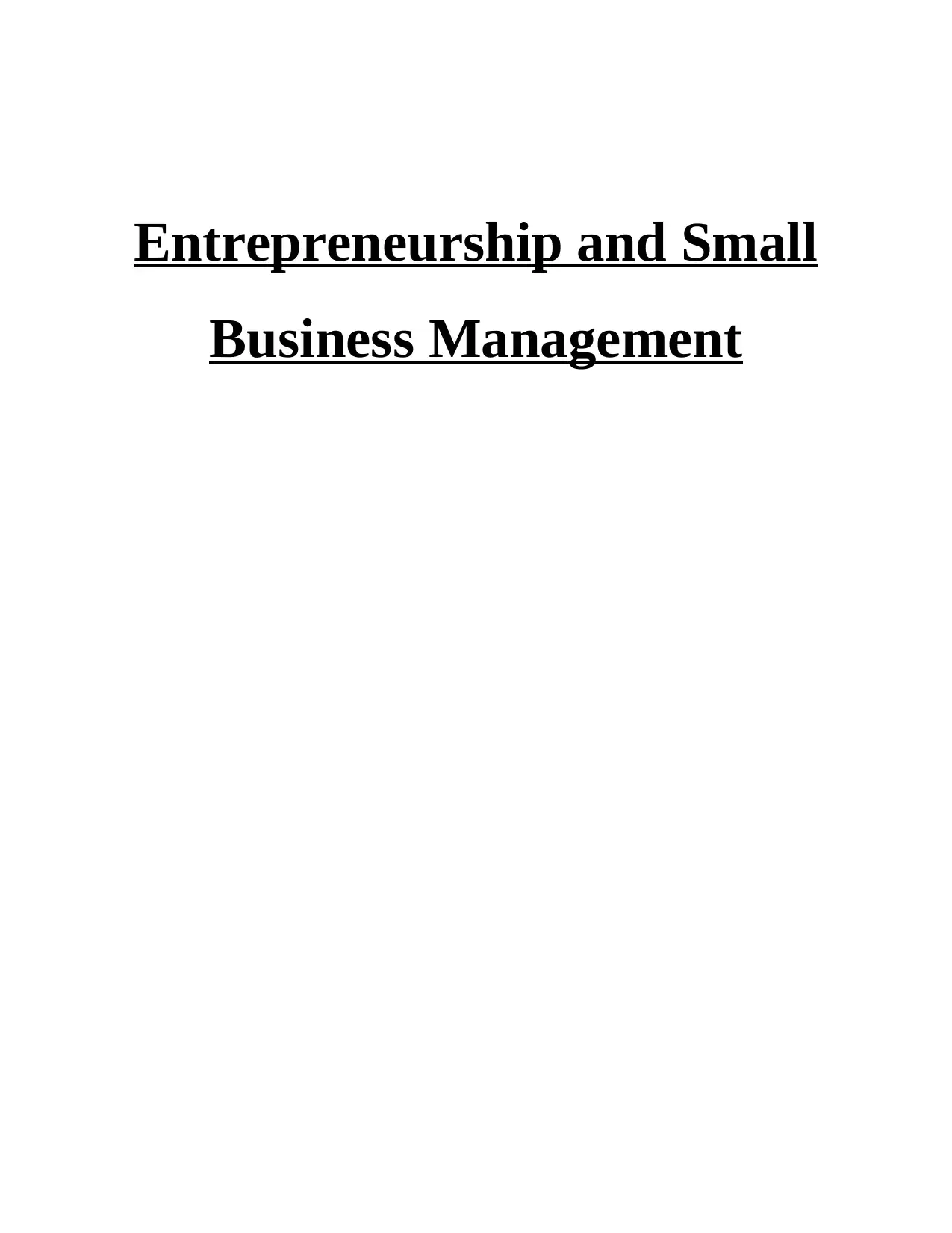
Entrepreneurship and Small
Business Management
Business Management
Paraphrase This Document
Need a fresh take? Get an instant paraphrase of this document with our AI Paraphraser
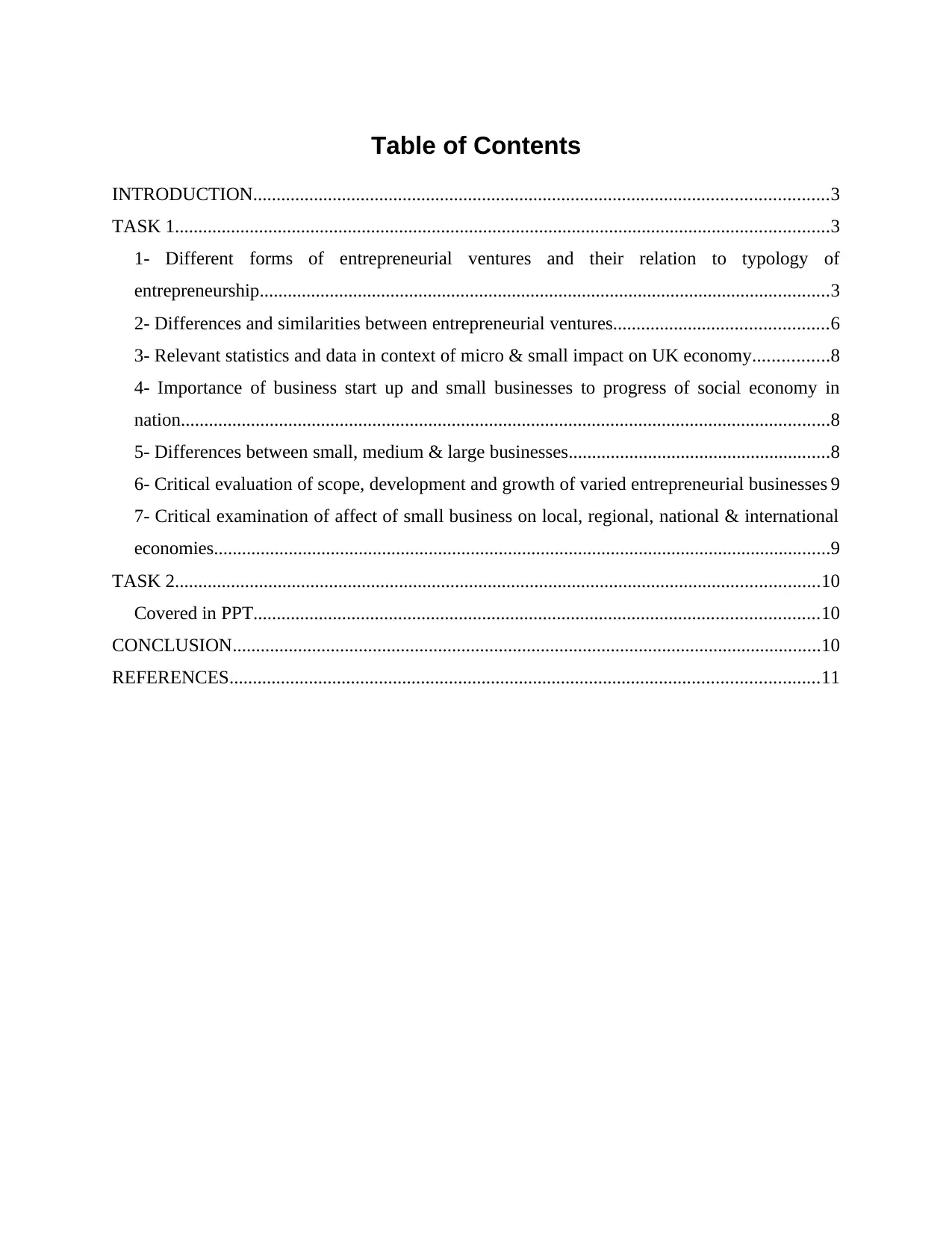
Table of Contents
INTRODUCTION...........................................................................................................................3
TASK 1............................................................................................................................................3
1- Different forms of entrepreneurial ventures and their relation to typology of
entrepreneurship..........................................................................................................................3
2- Differences and similarities between entrepreneurial ventures..............................................6
3- Relevant statistics and data in context of micro & small impact on UK economy................8
4- Importance of business start up and small businesses to progress of social economy in
nation...........................................................................................................................................8
5- Differences between small, medium & large businesses........................................................8
6- Critical evaluation of scope, development and growth of varied entrepreneurial businesses 9
7- Critical examination of affect of small business on local, regional, national & international
economies....................................................................................................................................9
TASK 2..........................................................................................................................................10
Covered in PPT.........................................................................................................................10
CONCLUSION..............................................................................................................................10
REFERENCES..............................................................................................................................11
INTRODUCTION...........................................................................................................................3
TASK 1............................................................................................................................................3
1- Different forms of entrepreneurial ventures and their relation to typology of
entrepreneurship..........................................................................................................................3
2- Differences and similarities between entrepreneurial ventures..............................................6
3- Relevant statistics and data in context of micro & small impact on UK economy................8
4- Importance of business start up and small businesses to progress of social economy in
nation...........................................................................................................................................8
5- Differences between small, medium & large businesses........................................................8
6- Critical evaluation of scope, development and growth of varied entrepreneurial businesses 9
7- Critical examination of affect of small business on local, regional, national & international
economies....................................................................................................................................9
TASK 2..........................................................................................................................................10
Covered in PPT.........................................................................................................................10
CONCLUSION..............................................................................................................................10
REFERENCES..............................................................................................................................11

INTRODUCTION
Entrepreneurship refer to the activity of setting up a venture or businesses, by taking a
financial risk in desire of profit. It considered as concept of managing and developing a company
in order to earn profit by taking different kinds of risks in business world. The current study will
explain varied kinds of entrepreneurial ventures, their interrelationship with typology of
entrepreneurship and similarities & differences between entrepreneurial ventures. It will justify
impact of micro and small business on UK economy, differences small, large and medium
businesses make to United Kingdom. It will justify scope, growth and development of varied
entrepreneurial ventures in UK economy. Furthermore, this assignment will critically evaluate
small businesses impact on local, regional, national and global economies. It explains skills and
characteristic traits of successful entrepreneurs which is different from other business managers,
reflection of entrepreneurial personality on mindset and motivation.
Moreover, this report will examine few lines of argument related to entrepreneurial
characteristic, role of background and experience to foster or hinder entrepreneurship and
connection between entrepreneurial characteristic as well as influence of personal experience and
background to successful entrepreneurs.
TASK 1
1- Different forms of entrepreneurial ventures and their relation to typology of entrepreneurship
Definition of entrepreneur-
Entrepreneur is an individual who starts their own venture, manages and organizes
business activities by taking major risks (Ogden, 2017). They take decision for success and
growth of its company in order to increase profitability.
Entrepreneurship meaning-
It is a procedure of designing, developing, launching and managing a new business in
specific marketplace in effective manner. The meaning of this term includes a businessman who
takes actions to take make a change in the world.
Types of entrepreneurial ventures-
Small business entrepreneurship-
In recent time, overwhelming number of start-ups and entrepreneur in UK are still small
ventures (Julien, 2018). It is an company or sole proprietorship that has fewer assets and annual
revenue than a medium firm. For example, salon, grocery stores or supermarket etc.
Entrepreneurship refer to the activity of setting up a venture or businesses, by taking a
financial risk in desire of profit. It considered as concept of managing and developing a company
in order to earn profit by taking different kinds of risks in business world. The current study will
explain varied kinds of entrepreneurial ventures, their interrelationship with typology of
entrepreneurship and similarities & differences between entrepreneurial ventures. It will justify
impact of micro and small business on UK economy, differences small, large and medium
businesses make to United Kingdom. It will justify scope, growth and development of varied
entrepreneurial ventures in UK economy. Furthermore, this assignment will critically evaluate
small businesses impact on local, regional, national and global economies. It explains skills and
characteristic traits of successful entrepreneurs which is different from other business managers,
reflection of entrepreneurial personality on mindset and motivation.
Moreover, this report will examine few lines of argument related to entrepreneurial
characteristic, role of background and experience to foster or hinder entrepreneurship and
connection between entrepreneurial characteristic as well as influence of personal experience and
background to successful entrepreneurs.
TASK 1
1- Different forms of entrepreneurial ventures and their relation to typology of entrepreneurship
Definition of entrepreneur-
Entrepreneur is an individual who starts their own venture, manages and organizes
business activities by taking major risks (Ogden, 2017). They take decision for success and
growth of its company in order to increase profitability.
Entrepreneurship meaning-
It is a procedure of designing, developing, launching and managing a new business in
specific marketplace in effective manner. The meaning of this term includes a businessman who
takes actions to take make a change in the world.
Types of entrepreneurial ventures-
Small business entrepreneurship-
In recent time, overwhelming number of start-ups and entrepreneur in UK are still small
ventures (Julien, 2018). It is an company or sole proprietorship that has fewer assets and annual
revenue than a medium firm. For example, salon, grocery stores or supermarket etc.
⊘ This is a preview!⊘
Do you want full access?
Subscribe today to unlock all pages.

Trusted by 1+ million students worldwide

High tech firms-
Companies under this category are those engaged in securing revenue and growth from
sectors characterized by rapidly and new changing technology. They comprehend and consider
changes that technological developments are brining (del Carmen Triana, Richard and Su,
2019.).
High growth firms-
They are found in all sectors and in all regions of nations, they tend to be more focused
in certain areas as opposed to increasing companies but the concentration is not essentially in
same industries.
Social entrepreneurship-
It is, at their most basic degree, doing businesses for a social cause. It also refers to as
altruistic entrepreneurship.
Start up entrepreneurship-
It considered in list of those companies, who start up their business recently and founded
by one or more persons to develop a unique service or product.
Large company entrepreneurship-
These can be defined as companies that have a solid set of life cycles, which make them
able to earn more than other operating in same sector.
Typology of entrepreneurship's-
Survival companies-
These firms are unable to earn much profit than medium size companies, as they face a
lot of issues to manage current activities due to several reasons like lack of money and resources.
Lifestyle firms-
It is the one that is geared toward helping owner's income and personal needs more than
increasing sales. For example, Flynndustries, LLC is a lifestyle company that owns variety of
online companies.
Managed growth companies-
Sainsbury’s is covered under this category, as they manage their business activities and
practice by developing effective plans or strategies.
Aggressive growth organizations-
Companies under this category are those engaged in securing revenue and growth from
sectors characterized by rapidly and new changing technology. They comprehend and consider
changes that technological developments are brining (del Carmen Triana, Richard and Su,
2019.).
High growth firms-
They are found in all sectors and in all regions of nations, they tend to be more focused
in certain areas as opposed to increasing companies but the concentration is not essentially in
same industries.
Social entrepreneurship-
It is, at their most basic degree, doing businesses for a social cause. It also refers to as
altruistic entrepreneurship.
Start up entrepreneurship-
It considered in list of those companies, who start up their business recently and founded
by one or more persons to develop a unique service or product.
Large company entrepreneurship-
These can be defined as companies that have a solid set of life cycles, which make them
able to earn more than other operating in same sector.
Typology of entrepreneurship's-
Survival companies-
These firms are unable to earn much profit than medium size companies, as they face a
lot of issues to manage current activities due to several reasons like lack of money and resources.
Lifestyle firms-
It is the one that is geared toward helping owner's income and personal needs more than
increasing sales. For example, Flynndustries, LLC is a lifestyle company that owns variety of
online companies.
Managed growth companies-
Sainsbury’s is covered under this category, as they manage their business activities and
practice by developing effective plans or strategies.
Aggressive growth organizations-
Paraphrase This Document
Need a fresh take? Get an instant paraphrase of this document with our AI Paraphraser
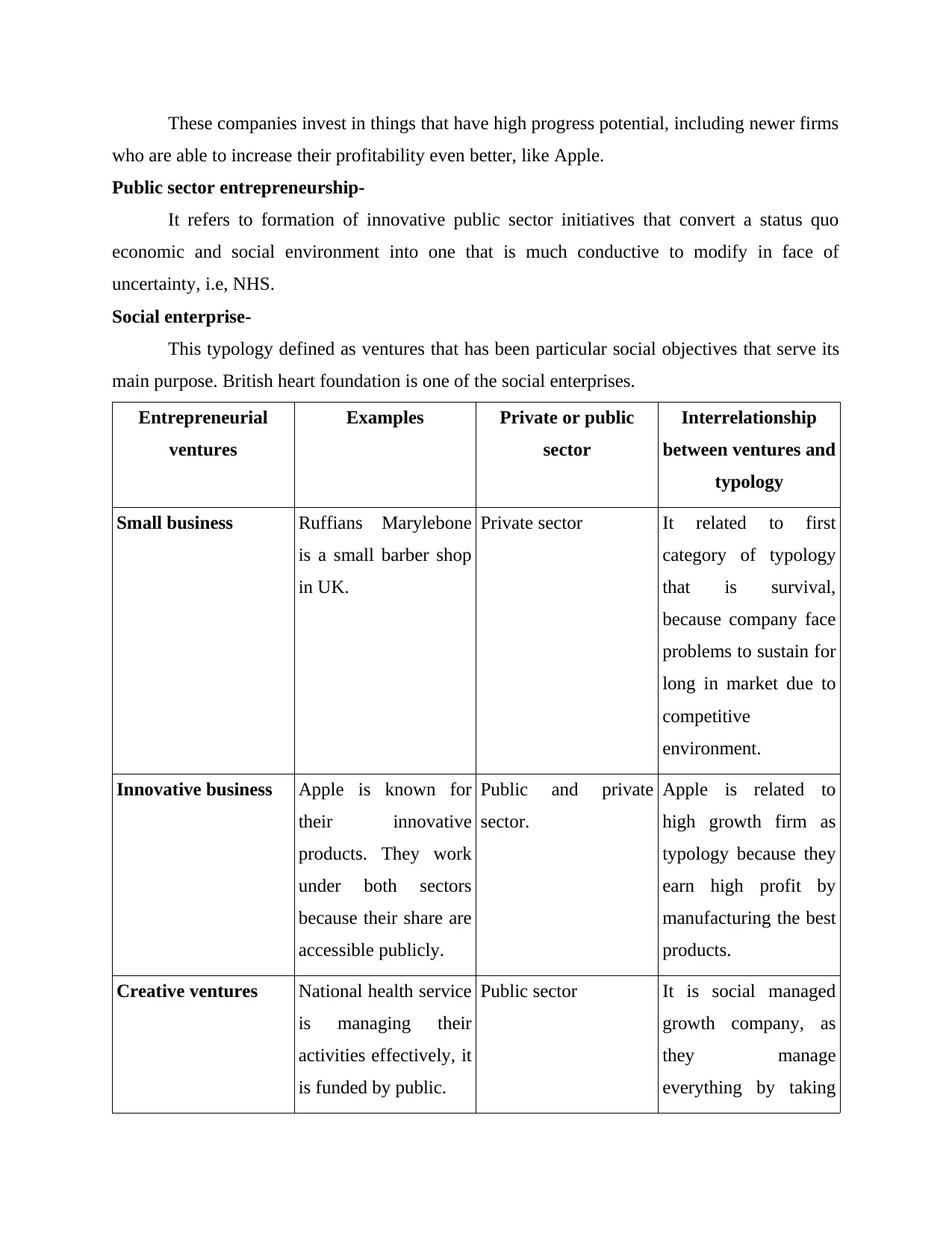
These companies invest in things that have high progress potential, including newer firms
who are able to increase their profitability even better, like Apple.
Public sector entrepreneurship-
It refers to formation of innovative public sector initiatives that convert a status quo
economic and social environment into one that is much conductive to modify in face of
uncertainty, i.e, NHS.
Social enterprise-
This typology defined as ventures that has been particular social objectives that serve its
main purpose. British heart foundation is one of the social enterprises.
Entrepreneurial
ventures
Examples Private or public
sector
Interrelationship
between ventures and
typology
Small business Ruffians Marylebone
is a small barber shop
in UK.
Private sector It related to first
category of typology
that is survival,
because company face
problems to sustain for
long in market due to
competitive
environment.
Innovative business Apple is known for
their innovative
products. They work
under both sectors
because their share are
accessible publicly.
Public and private
sector.
Apple is related to
high growth firm as
typology because they
earn high profit by
manufacturing the best
products.
Creative ventures National health service
is managing their
activities effectively, it
is funded by public.
Public sector It is social managed
growth company, as
they manage
everything by taking
who are able to increase their profitability even better, like Apple.
Public sector entrepreneurship-
It refers to formation of innovative public sector initiatives that convert a status quo
economic and social environment into one that is much conductive to modify in face of
uncertainty, i.e, NHS.
Social enterprise-
This typology defined as ventures that has been particular social objectives that serve its
main purpose. British heart foundation is one of the social enterprises.
Entrepreneurial
ventures
Examples Private or public
sector
Interrelationship
between ventures and
typology
Small business Ruffians Marylebone
is a small barber shop
in UK.
Private sector It related to first
category of typology
that is survival,
because company face
problems to sustain for
long in market due to
competitive
environment.
Innovative business Apple is known for
their innovative
products. They work
under both sectors
because their share are
accessible publicly.
Public and private
sector.
Apple is related to
high growth firm as
typology because they
earn high profit by
manufacturing the best
products.
Creative ventures National health service
is managing their
activities effectively, it
is funded by public.
Public sector It is social managed
growth company, as
they manage
everything by taking
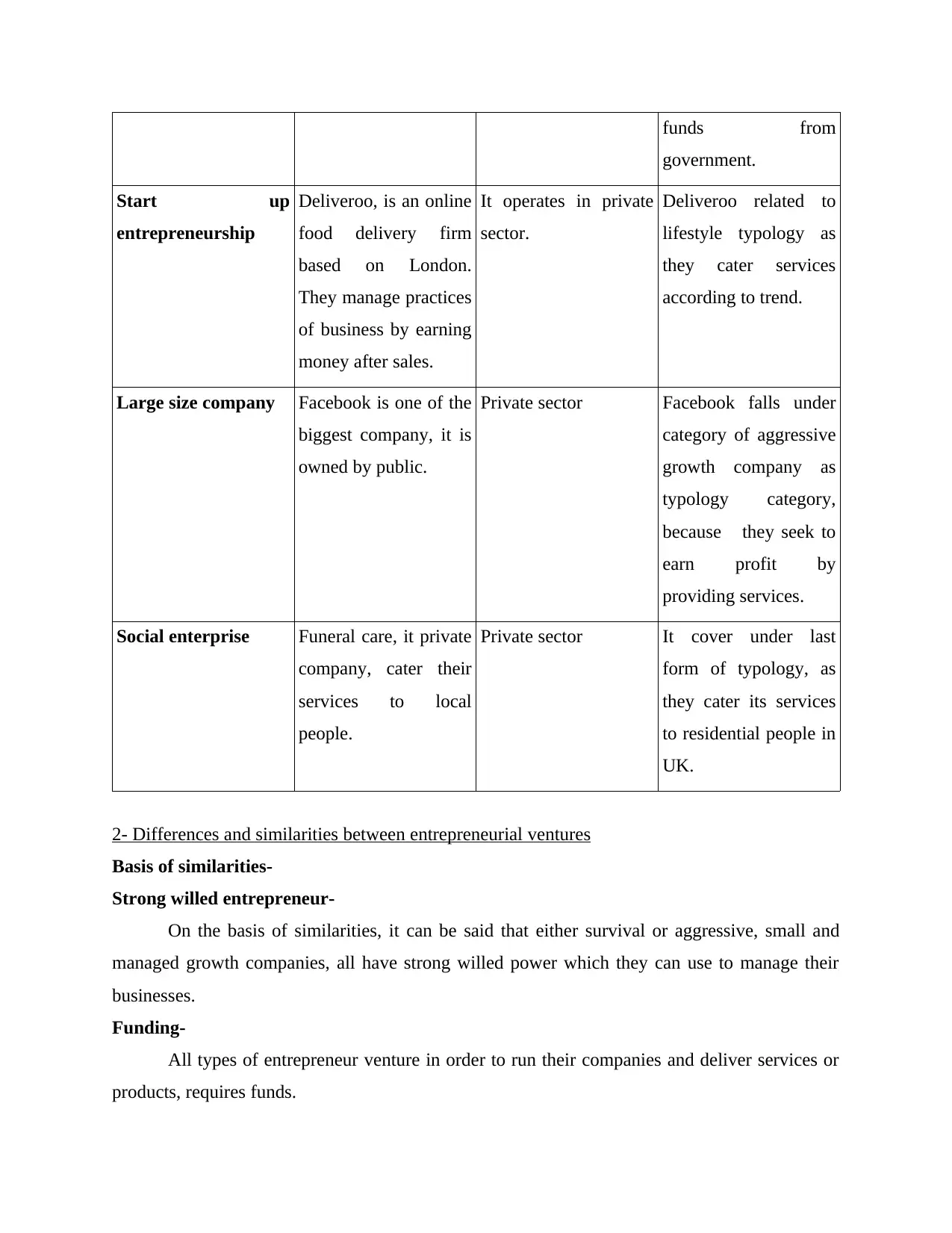
funds from
government.
Start up
entrepreneurship
Deliveroo, is an online
food delivery firm
based on London.
They manage practices
of business by earning
money after sales.
It operates in private
sector.
Deliveroo related to
lifestyle typology as
they cater services
according to trend.
Large size company Facebook is one of the
biggest company, it is
owned by public.
Private sector Facebook falls under
category of aggressive
growth company as
typology category,
because they seek to
earn profit by
providing services.
Social enterprise Funeral care, it private
company, cater their
services to local
people.
Private sector It cover under last
form of typology, as
they cater its services
to residential people in
UK.
2- Differences and similarities between entrepreneurial ventures
Basis of similarities-
Strong willed entrepreneur-
On the basis of similarities, it can be said that either survival or aggressive, small and
managed growth companies, all have strong willed power which they can use to manage their
businesses.
Funding-
All types of entrepreneur venture in order to run their companies and deliver services or
products, requires funds.
government.
Start up
entrepreneurship
Deliveroo, is an online
food delivery firm
based on London.
They manage practices
of business by earning
money after sales.
It operates in private
sector.
Deliveroo related to
lifestyle typology as
they cater services
according to trend.
Large size company Facebook is one of the
biggest company, it is
owned by public.
Private sector Facebook falls under
category of aggressive
growth company as
typology category,
because they seek to
earn profit by
providing services.
Social enterprise Funeral care, it private
company, cater their
services to local
people.
Private sector It cover under last
form of typology, as
they cater its services
to residential people in
UK.
2- Differences and similarities between entrepreneurial ventures
Basis of similarities-
Strong willed entrepreneur-
On the basis of similarities, it can be said that either survival or aggressive, small and
managed growth companies, all have strong willed power which they can use to manage their
businesses.
Funding-
All types of entrepreneur venture in order to run their companies and deliver services or
products, requires funds.
⊘ This is a preview!⊘
Do you want full access?
Subscribe today to unlock all pages.

Trusted by 1+ million students worldwide
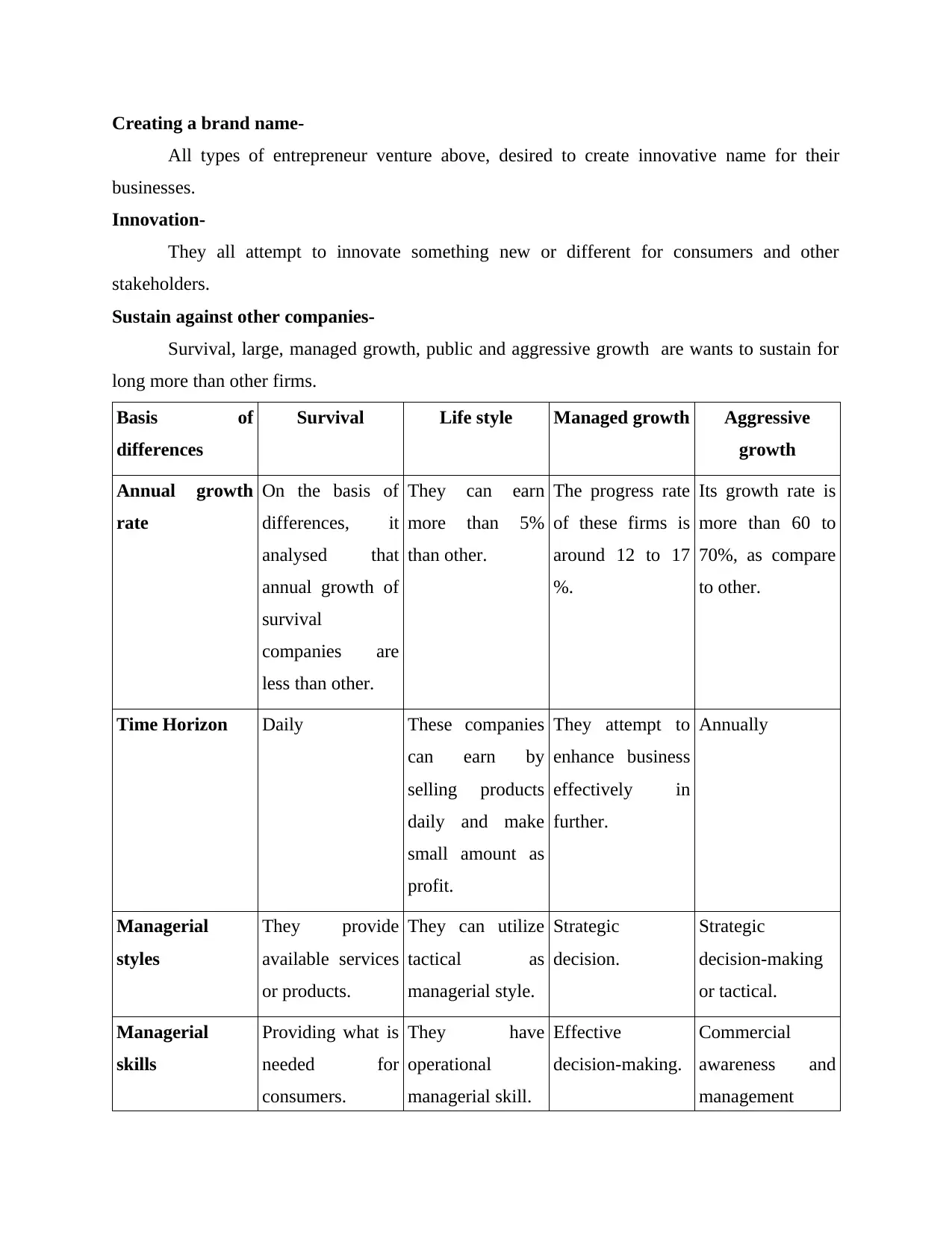
Creating a brand name-
All types of entrepreneur venture above, desired to create innovative name for their
businesses.
Innovation-
They all attempt to innovate something new or different for consumers and other
stakeholders.
Sustain against other companies-
Survival, large, managed growth, public and aggressive growth are wants to sustain for
long more than other firms.
Basis of
differences
Survival Life style Managed growth Aggressive
growth
Annual growth
rate
On the basis of
differences, it
analysed that
annual growth of
survival
companies are
less than other.
They can earn
more than 5%
than other.
The progress rate
of these firms is
around 12 to 17
%.
Its growth rate is
more than 60 to
70%, as compare
to other.
Time Horizon Daily These companies
can earn by
selling products
daily and make
small amount as
profit.
They attempt to
enhance business
effectively in
further.
Annually
Managerial
styles
They provide
available services
or products.
They can utilize
tactical as
managerial style.
Strategic
decision.
Strategic
decision-making
or tactical.
Managerial
skills
Providing what is
needed for
consumers.
They have
operational
managerial skill.
Effective
decision-making.
Commercial
awareness and
management
All types of entrepreneur venture above, desired to create innovative name for their
businesses.
Innovation-
They all attempt to innovate something new or different for consumers and other
stakeholders.
Sustain against other companies-
Survival, large, managed growth, public and aggressive growth are wants to sustain for
long more than other firms.
Basis of
differences
Survival Life style Managed growth Aggressive
growth
Annual growth
rate
On the basis of
differences, it
analysed that
annual growth of
survival
companies are
less than other.
They can earn
more than 5%
than other.
The progress rate
of these firms is
around 12 to 17
%.
Its growth rate is
more than 60 to
70%, as compare
to other.
Time Horizon Daily These companies
can earn by
selling products
daily and make
small amount as
profit.
They attempt to
enhance business
effectively in
further.
Annually
Managerial
styles
They provide
available services
or products.
They can utilize
tactical as
managerial style.
Strategic
decision.
Strategic
decision-making
or tactical.
Managerial
skills
Providing what is
needed for
consumers.
They have
operational
managerial skill.
Effective
decision-making.
Commercial
awareness and
management
Paraphrase This Document
Need a fresh take? Get an instant paraphrase of this document with our AI Paraphraser

skills.
Source of
finance
Take loan from
friends or family
members.
They can take
loan from banks.
Venture
capitalists
Take funds from
Angel investors.
3- Relevant statistics and data in context of micro & small impact on UK economy
Micro businesses-
These are organizations with annual incomes and assets valued at less than 250,00 per era
and with less than 5 workers.
Small business-
It is an independently operated and owned firm that is limited in size and in growth
depending on industry, they have more than 250 workers.
Micro and small businesses put positive impact on economy in the UK, as they help to
drive growth, open new market places and creating jobs for those who are unable to improve
their living standards. SME's in United Kingdom play vital role as they contribute to economy in
variety of ways, mentioned above. They cater more than 16.3 million employment opportunities
to local people and 60% of all private sector employment in country.
4- Importance of business start up and small businesses to progress of social economy in nation
Social economy-
It is a brand of economies that concentrate on connections between economics and social
behaviour (Ratten, Dana and Ramadani, 2017).
Start up and small businesses are playing important role in growth of social economy in
UK, by offering job chances to people who have low education. Another reason that state
significant of both elements is that they help by adding more GDP which is quite beneficial in
term of social economy progress.
Start up companies generate 25 percent of total GDP and the combined annual profit of
small business was 2.0 trillion, 52 percent of all private areas turnover. It clearly shows that how
much monetary value country receives from SMEs and start up companies and overall how they
benefit economy. They lead by spreading culture diversity at workplace without making any
differences.
Source of
finance
Take loan from
friends or family
members.
They can take
loan from banks.
Venture
capitalists
Take funds from
Angel investors.
3- Relevant statistics and data in context of micro & small impact on UK economy
Micro businesses-
These are organizations with annual incomes and assets valued at less than 250,00 per era
and with less than 5 workers.
Small business-
It is an independently operated and owned firm that is limited in size and in growth
depending on industry, they have more than 250 workers.
Micro and small businesses put positive impact on economy in the UK, as they help to
drive growth, open new market places and creating jobs for those who are unable to improve
their living standards. SME's in United Kingdom play vital role as they contribute to economy in
variety of ways, mentioned above. They cater more than 16.3 million employment opportunities
to local people and 60% of all private sector employment in country.
4- Importance of business start up and small businesses to progress of social economy in nation
Social economy-
It is a brand of economies that concentrate on connections between economics and social
behaviour (Ratten, Dana and Ramadani, 2017).
Start up and small businesses are playing important role in growth of social economy in
UK, by offering job chances to people who have low education. Another reason that state
significant of both elements is that they help by adding more GDP which is quite beneficial in
term of social economy progress.
Start up companies generate 25 percent of total GDP and the combined annual profit of
small business was 2.0 trillion, 52 percent of all private areas turnover. It clearly shows that how
much monetary value country receives from SMEs and start up companies and overall how they
benefit economy. They lead by spreading culture diversity at workplace without making any
differences.

5- Differences between small, medium & large businesses
Small-
These forms of businesses influence in positive manner as they provide services or
products to consumers in effective manner according to their needs (Savenok, Kusov and
Barambonye, 2018). Along with they cater employment chances more than medium companies,
to individual. They account for three fifth of employment and around half of profit in private
sector in the UK.
Medium-
Medium companies contribute in smaller amount, as they are not able to hire more than
2 people at workplace, but affect positively.
Large-
These firms make high contribution in growth and progress of economy, they offer job
opportunities more than above sectors effectively. Companies can hire 20 to 25 individual which
is one of the greater contributions they make to economy.
6- Critical evaluation of scope, development and growth of varied entrepreneurial businesses
Small, micro and other businesses have contributed towards development and growth of
GDP by selling products to target market which in return increase profit margin (Jili,
Masuku and Selepe, 2017).
5.82 million small businesses were developed in 2019 in the UK with 0 to 50 workers.
They account for 99.9 percent of business population.
SMEs attempt to produce new products under budget which is quite beneficial for them
in term of increasing sales and consumers base.
By investing in technology implementation and research & development they obtain
several benefits.
Innovations help in growth and development of SMEs.
All above factors helping in increasing profitability and productivity of entrepreneur
ventures,. For example, by selling innovative things companies can earn more and build
brand image in market.
7- Critical examination of affect of small business on local, regional, national & international
economies
Local economy-
Small-
These forms of businesses influence in positive manner as they provide services or
products to consumers in effective manner according to their needs (Savenok, Kusov and
Barambonye, 2018). Along with they cater employment chances more than medium companies,
to individual. They account for three fifth of employment and around half of profit in private
sector in the UK.
Medium-
Medium companies contribute in smaller amount, as they are not able to hire more than
2 people at workplace, but affect positively.
Large-
These firms make high contribution in growth and progress of economy, they offer job
opportunities more than above sectors effectively. Companies can hire 20 to 25 individual which
is one of the greater contributions they make to economy.
6- Critical evaluation of scope, development and growth of varied entrepreneurial businesses
Small, micro and other businesses have contributed towards development and growth of
GDP by selling products to target market which in return increase profit margin (Jili,
Masuku and Selepe, 2017).
5.82 million small businesses were developed in 2019 in the UK with 0 to 50 workers.
They account for 99.9 percent of business population.
SMEs attempt to produce new products under budget which is quite beneficial for them
in term of increasing sales and consumers base.
By investing in technology implementation and research & development they obtain
several benefits.
Innovations help in growth and development of SMEs.
All above factors helping in increasing profitability and productivity of entrepreneur
ventures,. For example, by selling innovative things companies can earn more and build
brand image in market.
7- Critical examination of affect of small business on local, regional, national & international
economies
Local economy-
⊘ This is a preview!⊘
Do you want full access?
Subscribe today to unlock all pages.

Trusted by 1+ million students worldwide

Small businesses at this level contribute by bringing innovation and growth to society in
which ventures is established.
Regional economy-
They contribute at regional level by producing direct or indirect jobs for people who live
in place where businesses are established (Paudel and Devkota, 2018).
National economy-
By increasing competitivenesses and innovation, small businesses impact positively
which drive all firms towards success.
International economy-
Small business impact on international economy effectively by constructing community
which is free of poverty. Most of the formal jobs that are accessible in developing markets are
developed by small businesses at international level.
TASK 2
Covered in PPT
CONCLUSION
From above analysis it has been concluded that small, medium and large companies
providing effective contribution in growth of UK economy in several manners like hiring,
increasing GDP and other. Furthermore, it has been summarized that there are varied types of
factors in personal and professional life available that hinder businessman.
which ventures is established.
Regional economy-
They contribute at regional level by producing direct or indirect jobs for people who live
in place where businesses are established (Paudel and Devkota, 2018).
National economy-
By increasing competitivenesses and innovation, small businesses impact positively
which drive all firms towards success.
International economy-
Small business impact on international economy effectively by constructing community
which is free of poverty. Most of the formal jobs that are accessible in developing markets are
developed by small businesses at international level.
TASK 2
Covered in PPT
CONCLUSION
From above analysis it has been concluded that small, medium and large companies
providing effective contribution in growth of UK economy in several manners like hiring,
increasing GDP and other. Furthermore, it has been summarized that there are varied types of
factors in personal and professional life available that hinder businessman.
Paraphrase This Document
Need a fresh take? Get an instant paraphrase of this document with our AI Paraphraser
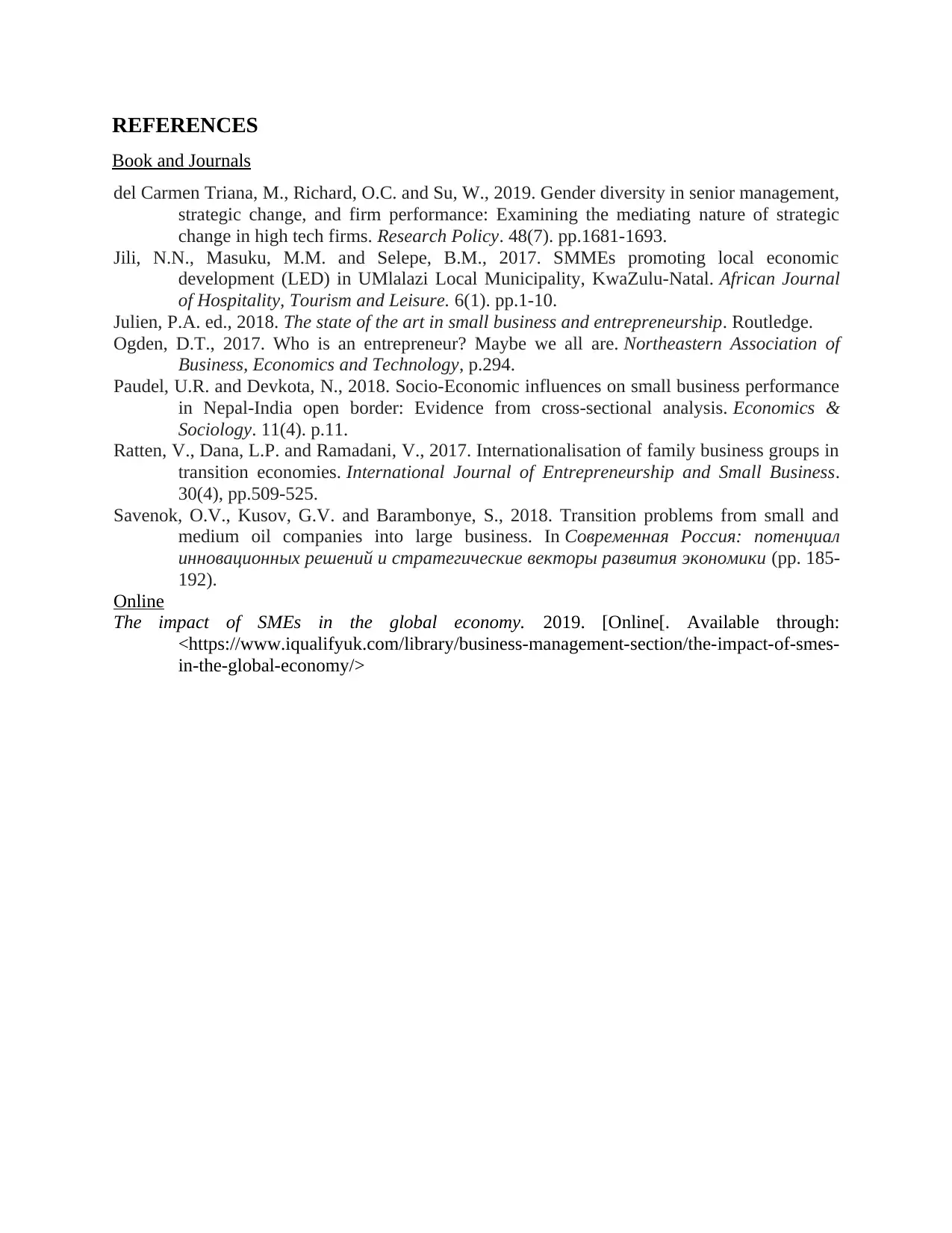
REFERENCES
Book and Journals
del Carmen Triana, M., Richard, O.C. and Su, W., 2019. Gender diversity in senior management,
strategic change, and firm performance: Examining the mediating nature of strategic
change in high tech firms. Research Policy. 48(7). pp.1681-1693.
Jili, N.N., Masuku, M.M. and Selepe, B.M., 2017. SMMEs promoting local economic
development (LED) in UMlalazi Local Municipality, KwaZulu-Natal. African Journal
of Hospitality, Tourism and Leisure. 6(1). pp.1-10.
Julien, P.A. ed., 2018. The state of the art in small business and entrepreneurship. Routledge.
Ogden, D.T., 2017. Who is an entrepreneur? Maybe we all are. Northeastern Association of
Business, Economics and Technology, p.294.
Paudel, U.R. and Devkota, N., 2018. Socio-Economic influences on small business performance
in Nepal-India open border: Evidence from cross-sectional analysis. Economics &
Sociology. 11(4). p.11.
Ratten, V., Dana, L.P. and Ramadani, V., 2017. Internationalisation of family business groups in
transition economies. International Journal of Entrepreneurship and Small Business.
30(4), pp.509-525.
Savenok, O.V., Kusov, G.V. and Barambonye, S., 2018. Transition problems from small and
medium oil companies into large business. In Современная Россия: потенциал
инновационных решений и стратегические векторы развития экономики (pp. 185-
192).
Online
The impact of SMEs in the global economy. 2019. [Online[. Available through:
<https://www.iqualifyuk.com/library/business-management-section/the-impact-of-smes-
in-the-global-economy/>
Book and Journals
del Carmen Triana, M., Richard, O.C. and Su, W., 2019. Gender diversity in senior management,
strategic change, and firm performance: Examining the mediating nature of strategic
change in high tech firms. Research Policy. 48(7). pp.1681-1693.
Jili, N.N., Masuku, M.M. and Selepe, B.M., 2017. SMMEs promoting local economic
development (LED) in UMlalazi Local Municipality, KwaZulu-Natal. African Journal
of Hospitality, Tourism and Leisure. 6(1). pp.1-10.
Julien, P.A. ed., 2018. The state of the art in small business and entrepreneurship. Routledge.
Ogden, D.T., 2017. Who is an entrepreneur? Maybe we all are. Northeastern Association of
Business, Economics and Technology, p.294.
Paudel, U.R. and Devkota, N., 2018. Socio-Economic influences on small business performance
in Nepal-India open border: Evidence from cross-sectional analysis. Economics &
Sociology. 11(4). p.11.
Ratten, V., Dana, L.P. and Ramadani, V., 2017. Internationalisation of family business groups in
transition economies. International Journal of Entrepreneurship and Small Business.
30(4), pp.509-525.
Savenok, O.V., Kusov, G.V. and Barambonye, S., 2018. Transition problems from small and
medium oil companies into large business. In Современная Россия: потенциал
инновационных решений и стратегические векторы развития экономики (pp. 185-
192).
Online
The impact of SMEs in the global economy. 2019. [Online[. Available through:
<https://www.iqualifyuk.com/library/business-management-section/the-impact-of-smes-
in-the-global-economy/>
1 out of 11
Related Documents
Your All-in-One AI-Powered Toolkit for Academic Success.
+13062052269
info@desklib.com
Available 24*7 on WhatsApp / Email
![[object Object]](/_next/static/media/star-bottom.7253800d.svg)
Unlock your academic potential
Copyright © 2020–2026 A2Z Services. All Rights Reserved. Developed and managed by ZUCOL.




